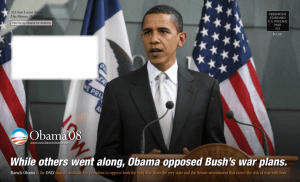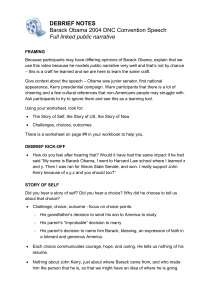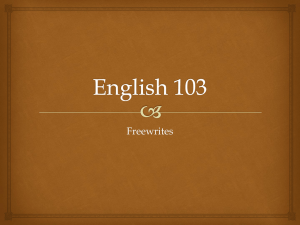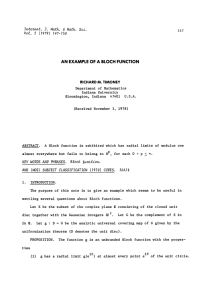Why real leaders are more than optimistic
advertisement
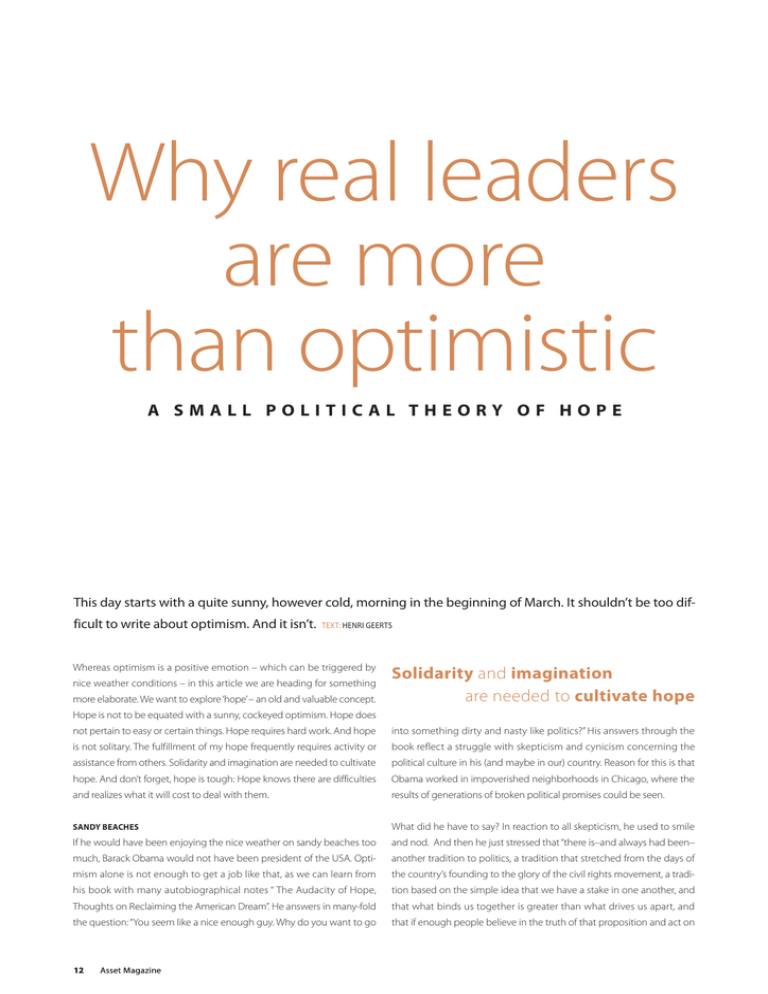
Why real leaders are more than optimistic A SMALL POLITICAL THEORY OF HOPE This day starts with a quite sunny, however cold, morning in the beginning of March. It shouldn’t be too difficult to write about optimism. And it isn’t. TEXT: HENRI GEERTS Whereas optimism is a positive emotion – which can be triggered by nice weather conditions – in this article we are heading for something more elaborate. We want to explore ‘hope’ – an old and valuable concept. Solidarity and imagination are needed to cultivate hope Hope is not to be equated with a sunny, cockeyed optimism. Hope does not pertain to easy or certain things. Hope requires hard work. And hope into something dirty and nasty like politics?” His answers through the is not solitary. The fulfillment of my hope frequently requires activity or book reflect a struggle with skepticism and cynicism concerning the assistance from others. Solidarity and imagination are needed to cultivate political culture in his (and maybe in our) country. Reason for this is that hope. And don’t forget, hope is tough: Hope knows there are difficulties Obama worked in impoverished neighborhoods in Chicago, where the and realizes what it will cost to deal with them. results of generations of broken political promises could be seen. SANDY BEACHES What did he have to say? In reaction to all skepticism, he used to smile If he would have been enjoying the nice weather on sandy beaches too and nod. And then he just stressed that “there is–and always had been– much, Barack Obama would not have been president of the USA. Opti- another tradition to politics, a tradition that stretched from the days of mism alone is not enough to get a job like that, as we can learn from the country’s founding to the glory of the civil rights movement, a tradi- his book with many autobiographical notes “ The Audacity of Hope, tion based on the simple idea that we have a stake in one another, and Thoughts on Reclaiming the American Dream”. He answers in many-fold that what binds us together is greater than what drives us apart, and the question: “You seem like a nice enough guy. Why do you want to go that if enough people believe in the truth of that proposition and act on 12 Asset Magazine it, then we might not solve every problem, but we can get something LISTENING TO PEOPLE meaningful done”. This was the mood that made him go into the country-side, in the Afterwards we can see that in repeating this answer, Barack Obama north and the east, speaking, no, listening to “people talk about became more and more convincing to others – and also, he convinced their jobs, their businesses, the local school; their anger at Bush and himself. But the years in office also took their toll. He got more and more their anger at Democrats; their dogs, their back pain, their war ser- doubts about the path he had chosen. He began feeling like an actor vice, and the things they remembered from childhood. Some had or athlete after years of commitment to a particular dream, after years well-developed theories to explain the loss of manufacturing jobs of waiting tables between auditions or scratching out hits in the minor or the high cost of health care. But most of them were too busy with leagues. He realized that he had gone just about as far as talent or fortune work or their kids to pay much attention to politics, and they spoke would take him. He got the feeling that his dream would not happen. In instead of what they saw before them: a plant closed, a promotion, his autobiography Obama describes this as the moment he had to face a high heating bill, a parent in a nursing home, a child’s first step.” the choice of accepting this fact like a grown-up and moving on to more sensible pursuits, or refusing the truth and ending up bitter, quarrelsome, What he heard in these conversations at first sight wasn’t very appeal- and slightly pathetic. ing. What struck him most was just “how modest people’s hopes were, He decided to an – or as he puts it himself - he arrived at acceptance of and how much of what they believed seemed to hold constant across his limits, and, in a way, his mortality. He took a new position towards his race, region, religion, and class. Most of them thought that anybody will- work in the state senate and became more satisfied with the reforms and ing to work should be able to find a job that paid a living wage. They initiatives he made possible. Furthermore, he spent more time at home, figured that people shouldn’t have to file for bankruptcy because they watched his daughters grow up, and he tried to be a good husband. got sick. They believed that every child should have a genuinely good Interestingly enough in this period, he took more time for physical exer- education–that it shouldn’t just be a bunch of talk–and that those same cises and read more novels. children should be able to go to college even if their parents weren’t Asset Magazine 13 rich. They wanted to be safe, from criminals and from terrorists; they got old, they wanted to be able to retire with some dignity and respect.” Hope can help us to anticipate for a better world That was about it. However, for Obama it was enough to know that he he gives in fifty-five chapters an overview of where traces of hope can be wanted that the government should help them, which isn’t the same as found. It starts with something personal as little daydreams”, but also the solving all their problems. utopian dimensions of fashion, advertising, display, fairy tales, travel, film, The message we get throughout this book is that Obama confronts his theater, jokes, and other cultural phenomena. own political task with the hope of the people he meets, which gives him The second volume depicts “Outlines of a Better World,” focusing on social the strength to be patient and to pursue knowledge confidently with and political utopias, including technological, architectural, and geo- integrity and humility. graphical utopias, as well as quests for world peace and a life of leisure. At wanted clean air, clean water, and time with their kids. And when they the end he discusses “Wishful Images of the Fulfilled Moment,” including CHARACTERISTICS COINED BY THOMAS AQUINAS morality, music, images of death, religion, morning-land of nature, and In an interesting comment on Obama’s political thoughts on hope, Cath- the highest good. leen Kaveny, professor of Law at het University of Notre Dame, starts with Like Bloch, I’m convinced of the perspective that hope permeates every- a small reflection on the special characteristics of hope. These character- day consciousness and its articulation in cultural forms, ranging from the istics have a long philosophical history as they were coined by Thomas fairy tale to the great philosophical and political utopias. Individuals are Aquinas. unfinished, they are animated by “dreams of a better life,” and by utopian What is hope? According to Thomas Aquinas, hope takes as its object “a longings for fulfillment. And of course, these dreams of a better life, are future good, difficult but possible to obtain.” Fundamentally, then, hope is the a way of relating to the future, a way of moving beyond and transcending For Bloch, ideology is “Janus-faced,” two-sided: it contains errors, mysti- the limitations, the darkness, the injustice of the present day. But there is fications, and techniques of manipulation and domination, but it also a particular way of doing so. contains a utopian residue or surplus that can be used for social critique First, hope does not pertain to easy or certain things, no matter how good and to advance progressive politics. In addition, to reconstructing and they may seem and how much we miss them right now. Second, precise- refocusing the theory and practice of ideology critique, Bloch also ena- ly because hope deals with difficulties, it requires hard work. The process bles us to see ideology in many phenomena, usually neglected by Marxist of pursuing the object of hope is arduous. Hope demands engagement, and other ideology critiques: daydreams, popular literature, architecture, not just bare acquiescence. And in fact, hope enables action in difficult department store displays, sports, or clothing. In this view, ideology per- times. We do not embark upon a difficult course of action unless we have vades the organization and details of everyday life. These may contain the hope that we will succeed. embellishing elements that anticipate a better world, that express in abstract and idealist fashion, the potentialities for a better future. But BLOOD, TOIL, TEARS AND SWEAT Bloch gives a warning: nobody should think that the present society has As an example of this we should take a look at the ‘Finest Hour’ speech of already realized most ideals. It is up to us in a constant cultural criticism to Winston Churchill in the beginning of World War II: look smartly for the deep seated desires for a better life. Hope can help us “We are in the preliminary stage of one of the greatest battles in history.... That to anticipate for a better world, help us to see what is deficient and lack- we are in action at many points — in Norway and in Holland —, that we ing in this world and something what should be fought for to produce a have to be prepared in the Mediterranean. That the air battle is continuous, better (i.e. freer and happier) future. and that many preparations have to be made here at home. I would say to the House as I said to those who have joined this government: Sources: I have nothing to offer but blood, toil, tears and sweat. We have before t1. The Audacity of Hope by Barack Obama Copyright 2006 by Barack Obama us an ordeal of the most grievous kind. We have before us many, many long t2. John Lukacs, “Blood, Toil, Tears and Sweat: The Dire Warning: Churchill’s First Speech as Prime months of struggle and of suffering. Minister” (BBC Audiobooks: London, 2008). You ask, what is our aim? I can answer in one word: Victory. Victory at all costs t3. Ernst Bloch, The Principle of Hope, three volumes (Cambridge, Mass.: The MIT Press, 1986). — Victory in spite of all terror — Victory, however long and hard the road may t4. Douglas Kellner; Ernst Bloch, Utopia and Ideology Critique, Vlaams Marxistisch Tijdschrift. be, for without victory there is no survival.” Zomernummer 2010. (Text transcription as originally read by Churchill) In conclusion, I would like to make some remarks on hope in which I’m inspired by Das Prinzip Hoffnung – The principle of Hope, a book written by Ernst Bloch. In the political speech of Barack Obama there is a consciousness that hope is more than the hope for a better life in political terms. It is only partly political and starts with the everyday life of citizens. TRACES OF HOPE The philosopher Ernst Bloch goes far beyond this consciousness when 14 Asset Magazine The Centre for Science and Values (CSV) explores the limits of science: where science meets moral issues, religious belief and social responsibility. It challenges people to discuss cultural and religious values, personal inspiration and fundamental presuppositions by organizing conferences, building networks and publishing articles. For the actual programme see www.uvt.nl/cwl



